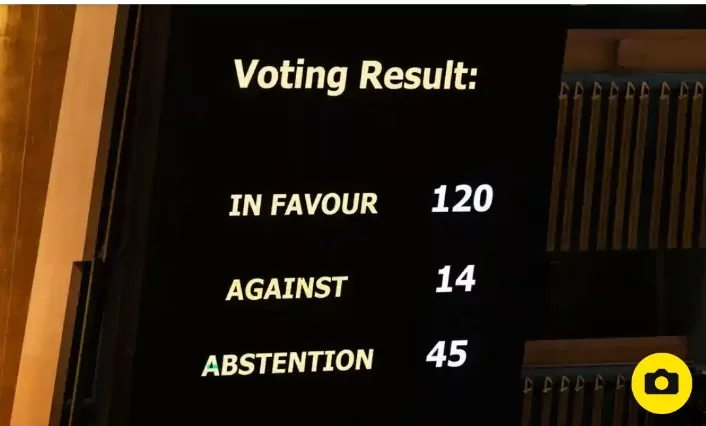In a striking display of diplomatic isolation, the United States found itself in a precarious position as a mere 12 countries, including Washington and Israel, opposed a resolution at the UN General Assembly. The motion, which called for an enduring humanitarian ceasefire leading to the cessation of hostilities, was overwhelmingly supported by 120 nations, while 45 abstained.
The outcome underscored the limited international backing for the global superpower. Notably, even traditional allies such as France, Spain, and the United Kingdom refrained from aligning with the United States in voting against the resolution.
The deep divisions within the European Union, which had become increasingly apparent in recent weeks, were starkly exposed as the bloc’s 27 members voted in three different ways, with the majority choosing to abstain. Notably, six of the votes in favor of the U.S. stance came from Pacific island nations: Fiji, Tonga, the Marshall Islands, Micronesia, Nauru, and Papua New Guinea.
In the lead-up to the vote, Jordan had made strategic adjustments to its initial resolution, aiming to garner maximum support. The updated resolution dropped the call for an immediate ceasefire in favor of a sustained humanitarian truce. Additionally, it emphasized that the release of “captives” must be unconditional.
However, Canada, backed by the United States, argued that these changes did not go far enough. Jordan’s resolution refrained from explicitly naming Hamas, instead condemning “all attacks of violence against Palestinian and Israeli citizens, including all acts of terror and indiscriminate attacks.” Furthermore, it characterized the individuals held by Hamas not as hostages but as unlawfully held captives.
U.S. Ambassador to the UN, Linda Thomas Greenfield, contended that the failure to name Hamas in the motion effectively empowered the militant organization governing Gaza.
When Canada proposed an amendment explicitly naming Hamas and describing the captives as hostages, it won the vote by a margin of 88 to 55, with 23 abstentions. All 27 EU member states and the UK supported the amendment. However, at the General Assembly, which requires a two-thirds majority for decisions, the Canadian amendment did not secure the necessary support.
This left UN envoys with a choice: support Jordan’s call for a humanitarian truce without an explicit reference to Hamas, abstain, or vote against it. Eight EU nations, led by France, backed the resolution. Among the major powers, Australia, India, and the UK chose to abstain. The U.S. alliance opposing the resolution represented a mere 7% of the seats in the General Assembly, a situation reminiscent of the diplomatic isolation Russia experienced in the context of the Ukraine crisis over the past two years.
Jordan celebrated the outcome, with its Foreign Minister, Ayman Safadi, stating that the General Assembly had “spoken for justice.” He argued that the resolution “is a clear stand against Israel’s war, against the killing of Palestinians, against war crimes, on the side of international law.”
It is essential to note that this resolution is non-binding, serving as a snapshot of global opinion. The United Nations Security Council, the body capable of passing binding resolutions, has struggled to address the crisis, as it requires the cooperation of either Russia or the United States, both of which possess veto power.




